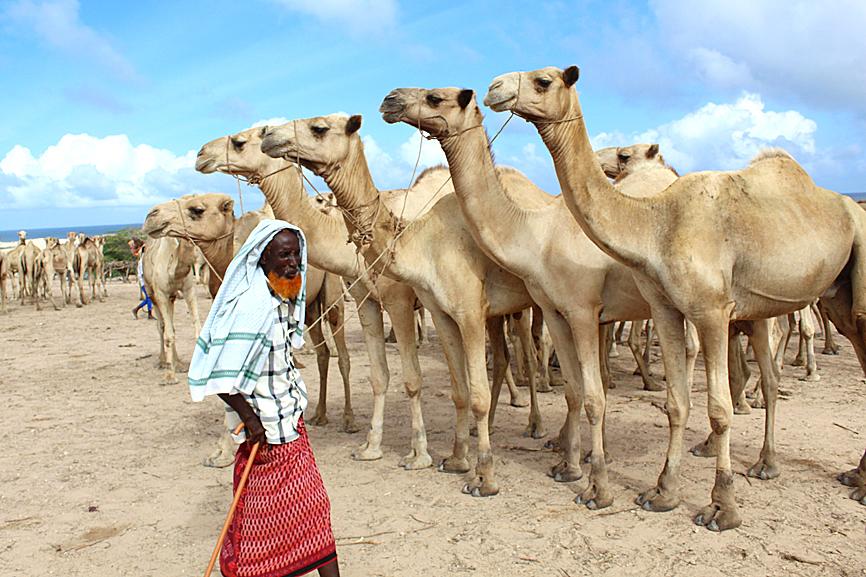The annual Muslim pilgrimage to Mecca is a time for celebration, not least among Somalia’s livestock herders and traders who export millions of livestock to feed pilgrims.
This year, COVID-19 restrictions mean the hajj is a small, largely Saudi affair, and Somalia’s economy is suffering.
“Business is bad,” said Yahye Hassan, who works in Mogadishu’s largest livestock market where the pandemic has suppressed trade.

Photo: AFP
“The effect of coronavirus is apparent,” Hassan said. “The Arab countries are not in need of animals from Somalia, and the nomadic people who would bring the livestock to town for trading are reluctant due to the fear of infection.”
“There is a major decrease in demand,” said Nur Hassan, another Mogadishu-based livestock trader, who said the shortage of domestic and foreign buyers was catastrophic, while supply had also seen a dip as herders stay away.
The hajj, which began last week, is mandatory for all Muslims who are physically and financially able to undertake at least once in their lifetime and involves pilgrimage to the holy city of Mecca and its Grand Mosque.
Saudi authorities this year have restricted the hajj to those already inside the country — fewer than 10,000 domestic pilgrims are expected, compared with the 2 million mostly foreign visitors who attended last year — effectively canceling the annual ceremony for most.
Saudi demand accounts for nearly two-thirds of Somalia’s annual livestock exports, according to the World Bank, which reports that in 2015 more than 5 million sheep, goats, camels and cattle were shipped northwards from Somalian ports through the Gulf of Aden and the Red Sea to Saudi Arabia.
Exports are predicted to be sliced in half this year, primarily due to COVID-19 travel restrictions.
“The hajj cancelation has massive implications on the lives and livelihoods of the Somalian population,” said Ahmed Khalif, Somalia country director at the Action Against Hunger charity, adding that livestock accounts for about 60 percent of household income in the largely rural country.
“It is a blow to the Somalian pastoralist households particularly, who heavily survive on livestock exports to Saudi,” Khalif said.
Up to three-quarters of Somalia’s export earnings come from livestock, making the foreign sale of animals a crucial lifeline for Somalia’s economy, Khalif added.
The annual hajj is normally a reliable boom time for herders, but not this year.
“The livestock exports happen all through the year, but the majority — 70 percent of live animals — happen during this hajj season,” Khalif said.
The evaporation of exports has meant an oversupply in local markets, where prices have dropped dramatically, with camels going for US$500, half their usual price, Khalif said.
This might be good news for a relatively small number of well-off consumers, but it is a disaster for the majority of livestock-keepers who rely on sales to buy food, pay back debts and cover basics such as school fees.
Making matters even worse, keeping animals for longer than expected is a drain on limited resources, said Isse Muse Mohamed, a livestock trader in the port town of Eyl, who warned of “widespread effects” for the economy.

Airlines in Australia, Hong Kong, India, Malaysia and Singapore yesterday canceled flights to and from the Indonesian island of Bali, after a nearby volcano catapulted an ash tower into the sky. Australia’s Jetstar, Qantas and Virgin Australia all grounded flights after Mount Lewotobi Laki-Laki on Flores island spewed a 9km tower a day earlier. Malaysia Airlines, AirAsia, India’s IndiGo and Singapore’s Scoot also listed flights as canceled. “Volcanic ash poses a significant threat to safe operations of the aircraft in the vicinity of volcanic clouds,” AirAsia said as it announced several cancelations. Multiple eruptions from the 1,703m twin-peaked volcano in

Farmer Liu Bingyong used to make a tidy profit selling milk but is now leaking cash — hit by a dairy sector crisis that embodies several of China’s economic woes. Milk is not a traditional mainstay of Chinese diets, but the Chinese government has long pushed people to drink more, citing its health benefits. The country has expanded its dairy production capacity and imported vast numbers of cattle in recent years as Beijing pursues food self-sufficiency. However, chronically low consumption has left the market sloshing with unwanted milk — driving down prices and pushing farmers to the brink — while

China has built a land-based prototype nuclear reactor for a large surface warship, in the clearest sign yet Beijing is advancing toward producing the nation’s first nuclear-powered aircraft carrier, according to a new analysis of satellite imagery and Chinese government documents provided to The Associated Press. There have long been rumors that China is planning to build a nuclear-powered aircraft carrier, but the research by the Middlebury Institute of International Studies in California is the first to confirm it is working on a nuclear-powered propulsion system for a carrier-sized surface warship. Why is China’s pursuit of nuclear-powered carriers significant? China’s navy is already

‘SIGNS OF ESCALATION’: Russian forces have been aiming to capture Ukraine’s eastern Donbas province and have been capturing new villages as they move toward Pokrovsk Ukrainian Commander-in-Chief Oleksandr Syrskyi on Saturday said that Ukraine faced increasing difficulties in its fight against Moscow’s invasion as Russian forces advance and North Korean troops prepare to join the Kremlin’s campaign. Syrskyi, relating comments he made to a top US general, said outnumbered Ukrainian forces faced Russian attacks in key sectors of the more than two-and-a-half-year-old war with Russia. Ukrainian President Volodymyr Zelenskiy in a nightly address said that Ukraine’s military command was focused on defending around the town of Kurakhove — a target of Russia’s advances along with Pokrovsk, a logistical hub to the north. He decried strikes